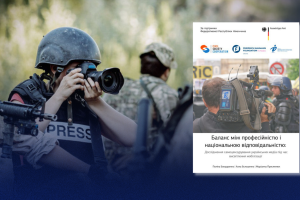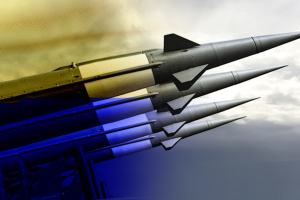Public opinion about non-controlled Donbas: what has changed
The nationwide polling was conducted by the Ilko Kucheriv Democratic Initiatives Foundation and the Razumkov Centre from June 9-13, 2017. A total of 2018 respondents ages 18 and older were polled across all regions of Ukraine with the exception of the Crimean Autonomous Republic and the occupied territories in the Donetsk and Luhansk oblasts. The theoretical margin of error does not exceed 2.3%.
For comparison, data of nationwide polling conducted by the Ilko Kucheriv Democratic Initiatives Foundation (DIF) jointly with the Kyiv International Institute of Sociology (KIIS) from October 9-19, 2015 and data from the polling conducted by the Ilko Kucheriv Democratic Initiatives Foundation (DIF) and Razumkov Centre Sociological Service from May 11-16, 2016, are provided.
● Only 18% of the population in Ukraine support the establishment of peace in the Donbas by force. At the same time, the peace «at any price» is supported also by only 18% of those polled. The majority of the population – 52% – believes that “for the sake of peace it is necessary to accept compromises but not all of them” (The admissibility or inadmissibility of certain compromises was studied in the previous survey – see[1].)
● Readiness for compromises is reducing with increasing of the distance from the zone of hostilities. Thus, every forth respondent in the East and only one in ten in the West demonstrate readiness to make any compromises for the sake of peace.
● Population in Ukraine considers the international pressure on Russia aimed at ending its interference in the Donbas conflict (38%) and the successful restoration of normal life in the Ukraine-controlled areas of Donbas (28%) as the most effective among the proposed measures for establishing peace in the Donbas. Compared to the last year, there is a decrease of the number of people who believe that for the establishment of peace it is necessary to stop funding these territories[2] (from 20% to 11%), declare Russian as the second state language (from 11% to 5%) and to introduce a federal system of governance in Ukraine (from 7.5% to 5%)
● The population mostly supports the decision of the National Security and Defense Council of Ukraine on the blockade of trade with the "DPR" and "LPR": 47% of the respondents support this decision, against - 37%. The highest support for the blockade is in the West (66%), and somewhat lower in the Centre (47%) of Ukraine. It is noteworthy that the smallest number of supporters of such decision is in the South – 30%, while in the East it makes up 38%.
● The majority of the population in Ukraine supports the proposal to legally recognize the uncontrolled territories of Donetsk and Lugansk oblasts occupied: 55% - for, 22% - against, and almost a quarter of respondents have not decided on this issue. The highest level of support for legally fixing the fact of occupation is in the West (64%) and in the Center (59%) of Ukraine. In the East – 49% of respondents support the legislative consolidation of the fact of territorial occupation in the Donbas, and the smallest amount of supporters for such actions is in the South – 35%.
● The political future of the self-proclaimed "DPR" and "LPR" is seen by 55% of Ukrainians as these territories are a part of Ukraine on pre-war conditions. Every fifth respondent is inclined to giving these territories a greater degree of autonomy within Ukraine and about 9% support the independent existence of these entities or even their accession to Russia. In general, support for proposals of providing more rights to currently uncontrolled territories of the Donbas has decreased compared to the last year. The greatest support of granting the autonomy rights to the territories of the "DPR" and LPR "is in the East (28%), but still the majority in this region (47%) prefers that these territories remain in Ukraine in pre-war status.
● Support for the idea of introducing an international peacekeeping contingent to the Donbas continues to grow. Now it is over 60%, and only a fifth of the population in Ukraine opposes it. The only macro-region in Ukraine, where the number of opponents of peacekeepers is roughly equal to the number of supporters, is the South (38% - against, 36% - for). It is worth noting a significant proportion of respondents who have not decided on this issue - today they make up 19% all over Ukraine, most of them - in the South (25%).
● Among the possible policy options for Ukraine regarding the uncontrolled territories in the Donetsk and Luhansk oblasts, the survey revealed a lack of a consolidated position: 23% of the population support the complete isolation of so-called "DPR" and "LPR"; 22% – consider it appropriate to keep the economic blockade but maintain humanitarian relations, 22% of respondents favor the permission to trade in critical goods (food and FMCG products from Ukraine and anthracite coal on the side of the uncontrolled territories) and the maximum support of humanitarian ties, while 15 % support the maximum development of ties with uncontrolled territories (so called “DPR” and “LPR”) – both humanitarian and trade.
● Population in Ukraine has an ambiguous attitude regarding some social and humanitarian policies in relation to uncontrolled areas of the Donbas. Citizens rather support simplification of access to education in Ukrainian educational institutions of different levels for residents of uncontrolled territories (60%), provision of support (financial and material) to residents of uncontrolled territories seeking to move to the territory controlled by Ukraine (59%), strengthening control over payments to internally displaced persons (IDPs) in order to avoid abuse (69%), more serious control over the crossing of the delimitation line in the Donbas (55%), simplification of the receipt of any administrative services in front-line settlements (47%) and permission to trade in food and basic goods with uncontrolled territories of the Donbas (47%).
● At the same time, the population is mainly against lifting the restrictions on social and pension payments to Ukrainian citizens residing in the uncontrolled territories of Donbas (42%). And views on the simplifying the crossing of the delimitation line and facilitating the regime for obtaining passes are divided almost in half: 38% support this proposal, and 40% - do not support it, and with a clear regional division: the idea is supported by the majority in the East (52%) and the South (48%) and is perceived negatively in the West (51%) and in the Centre (46%) of Ukraine.
[1]http://dif.org.ua/article/the%20future%20of%20occupied%20territories%20in%20the%20Donbas:%20possible%20variants23
[2] Areas of Donbas which are currently uncontrolled by the Ukrainian government (so-called “DPR” and “LPR”)








